Human resources (HR) law certification courses have become increasingly important in today’s complex work environment.
As businesses strive to maintain compliance with labor laws and regulations, HR professionals must possess the right skills to navigate employment laws effectively.
Getting an HR law certification demonstrates a professional’s dedication to staying updated on legal developments and compliance issues, making them invaluable assets to their organizations.
HR law certification courses cover a wide range of topics, including employment and labor laws, employee benefits, workplace investigations, compensation, and payroll.
These credentials equip HR specialists with the essential knowledge required to minimize the potential for costly litigation. So, by obtaining a certification, HR professionals can set themselves apart in a competitive job market and potentially advance their careers.
Top Rated HR Law Certification Courses
If you are investing time and resources into obtaining an HR law certification, you must ensure you are going for the right one. Below are some of the top-rated HR law certification courses available:
1. HR University – Diversity and Inclusion Certification
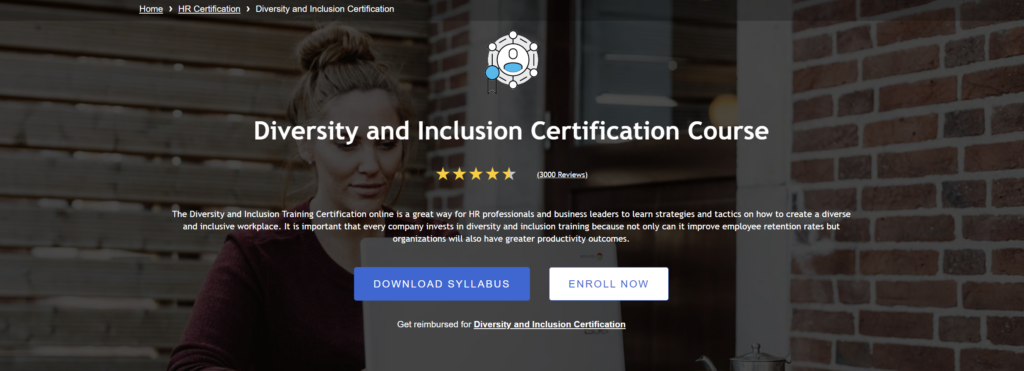
HR University’s Diversity and Inclusion Certification course is an extensive learning program designed to equip participants with the essential knowledge to develop and implement effective diversity and inclusion strategies while ensuring legal compliance. T
The course comprises over 120 lectures, 15+ case studies, and exclusive interviews with DEI professionals, with new content being added regularly. It covers topics such as employment discrimination, the Civil Rights Act, and other relevant HR laws
Learners will delve into the key principles of diversity and inclusion, strategies for working effectively with a diverse workforce, and techniques for managing challenging conversations.
Key features of the Diversity and Inclusion Certification at HR University include:
- Comprehensive curriculum focused on diversity and inclusion in the workplace (updated regularly)
- In-depth coverage of relevant HR laws and regulations delivered through 120+ lectures, 15+ case studies, and exclusive interviews with DEI professionals
- Access to a network of industry professionals for support and guidance
- Personalized instructor feedback on the capstone project
2. HR University – HR Generalist Certification
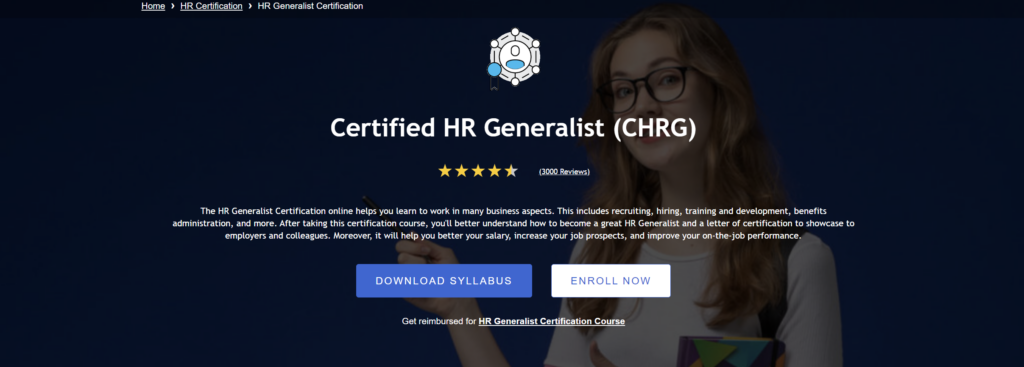
HR University’s HR Generalist Certification is designed to provide a broad understanding of HR law and compliance, covering topics such as the National Labor Relations Act, the Fair Labor Standards Act, the Medical Leave Act, and age discrimination. This certification is ideal for professionals seeking a well-rounded foundation in human resources.
Participants learn the essentials of being an HR professional, master techniques for acing human resources interviews, and discover how to stand out as exceptional candidates to secure the job.
Highlights of the HR Generalist Certification at HR University include:
- Comprehensive coverage of essential HR law topics (updated regularly)
- Over 50 lectures, 5+ downloadable HR templates, and exclusive interviews with industry professionals
- Expert instruction from experienced HR professionals
- Opportunities for networking and ongoing professional development
3. Society for Human Resource Management (SHRM) – SHRM-CP and SHRM-SCP Certifications
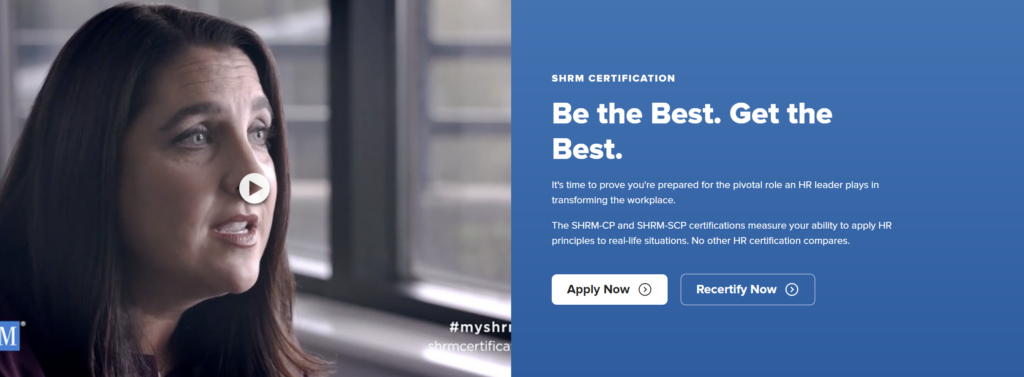
The Society for Human Resource Management (SHRM) offers the SHRM Certified Professional (SHRM-CP) and SHRM Senior Certified Professional (SHRM-SCP) certifications, which demonstrate expertise in HR practices and labor laws. These certifications are designed for HR professionals at various stages of their careers, with the SHRM-CP aimed at early- to mid-career professionals and the SHRM-SCP targeted at senior-level practitioners.
The SHRM certifications cover a range of HR law topics, including employment law, labor relations, and compliance. Professionals seeking these certifications must meet eligibility requirements and pass a comprehensive exam.
Key features of the SHRM certifications include:
- Comprehensive coverage of HR law and best practices
- Ongoing professional development opportunities through SHRM
4. HR Certification Institute (HRCI) – PHR and SPHR Certifications

The HR Certification Institute (HRCI) offers the Professional in Human Resources (PHR) and Senior Professional in Human Resources (SPHR) certifications. These certifications cover various aspects of HR law and compliance, making them valuable credentials for HR professionals.
The PHR certification is designed for HR professionals who focus on operational aspects of HR, while the SPHR certification targets those in strategic and policy-making roles. Both certifications require candidates to meet eligibility criteria and pass a rigorous exam.
Notable aspects of the HRCI certifications include:
- Comprehensive coverage of HR law and compliance topics
- Access to ongoing professional development resources
5. Cornell University – Employment Law Certificate
Cornell University’s Employment Law Certificate is an online program that focuses on employment law, including compliance, risk management, and dispute resolution. The program is designed for HR professionals seeking a deeper understanding of employment law and its implications for their organizations.
Participants in this program will learn about key employment law topics, such as discrimination, harassment, wage and hour regulations, and leave management. They will also explore strategies for minimizing risk and maintaining compliance with applicable laws.
Highlights of the Cornell University Employment Law Certificate include:
- In-depth coverage of essential employment law topics
- Online format for flexibility and convenience
- Expert instruction from Cornell University faculty
- Higher cost than average HR certification courses
6. World at Work – CCP Certification
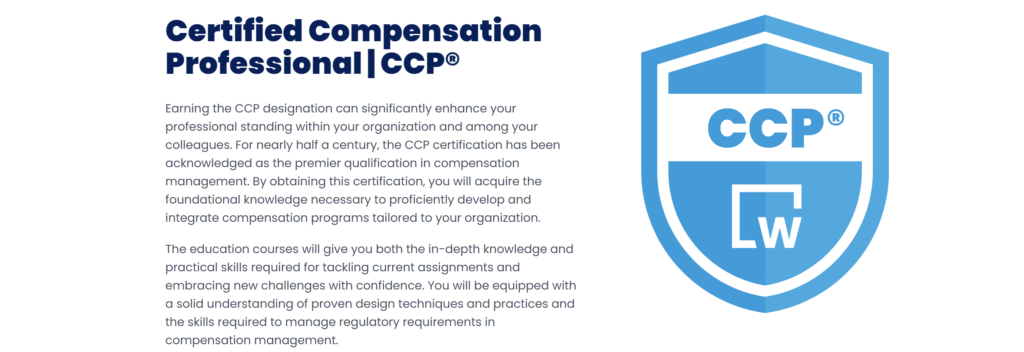
The Certified Compensation Professional (CCP) certification, offered by World at Work, includes coursework on legal compliance for compensation and benefits professionals. This certification is designed for HR professionals who manage compensation programs and need to ensure compliance with relevant laws and regulations.
Highlights of the CCP certification include:
- In-depth focus on compensation and related legal issues
- Comprehensive exams to validate knowledge and skills
- Access to a network of compensation professionals for ongoing support
7. International Foundation of Employee Benefit Plans (IFEBP) – CEBS Certification
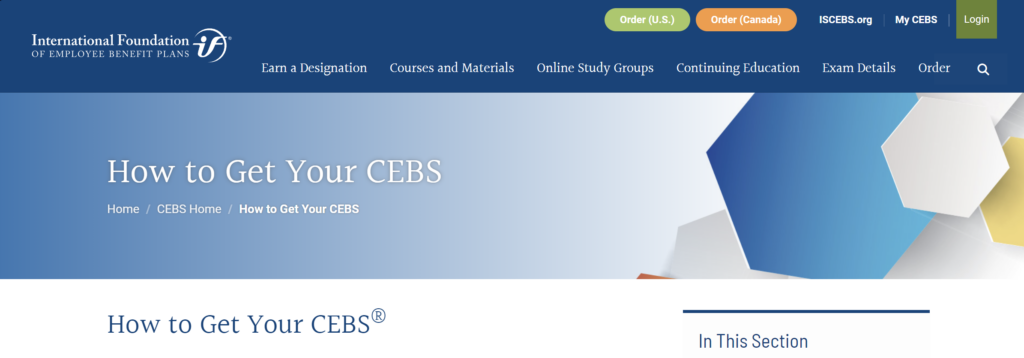
The Certified Employee Benefit Specialist (CEBS) designation, offered by the International Foundation of Employee Benefit Plans (IFEBP), includes coursework on legal and regulatory issues in employee benefits. This certification is ideal for HR professionals who manage employee benefit programs and need to ensure compliance with applicable laws and regulations.
The CEBS program covers a range of topics, such as health and welfare benefits, retirement plans, and executive compensation. Participants will learn about the legal requirements associated with these benefits and strategies for maintaining compliance.
Highlights of the CEBS certification include:
- In-depth focus on employee benefits and related legal issues
- Flexible, self-paced learning options
- Access to a network of benefits professionals for ongoing support
8. American Payroll Association (APA) – CPP and FPC Certifications
The American Payroll Association (APA) offers the Certified Payroll Professional (CPP) and Fundamental Payroll Certification (FPC) certifications, which cover payroll-related labor laws and compliance issues. These certifications are ideal for HR professionals responsible for managing payroll and ensuring compliance with wage and hour regulations.
The CPP certification is designed for experienced payroll professionals, while the FPC certification is suitable for those new to the field or seeking a foundational understanding of payroll. Both certifications require candidates to pass an exam and maintain their credentials through continuing education.
Key features of the APA certifications include:
- Specialized focus on payroll and related labor laws
- Comprehensive exams to validate knowledge and skills
- Access to ongoing professional development and resources
FAQs
Here are the most frequently asked questions about employee law certificates.
What is an employee law certificate?
An employee law certificate is a formal recognition that a professional has gained knowledge in labor and employment law, including human resources policies and legal compliance requirements.
Who should consider getting an employee law certificate?
Human resource professionals, legal counsel, and others involved in managing labor relations or compliance should consider obtaining an employee law certificate to ensure they are well-versed in current labor and employment law.
How does an employee law certificate benefit human resource professionals?
An employee law certificate helps human resource professionals stay up to date with the latest regulations from organizations like the Equal Employment Opportunity Commission (EEOC). This knowledge helps them manage workplace compliance more effectively.
Is an employee law certificate required to work in human resources?
While not always required, having an employee law certificate can enhance career prospects for HR professionals, providing a competitive edge by demonstrating a deeper understanding of labor and employment law.
What topics are typically covered in an employee law certificate program?
These programs often cover subjects such as labor law, equal employment opportunity regulations, employee rights, workplace safety, and other issues that are critical for human resource and legal compliance.
How long does it take to earn an employee law certificate?
The length of time varies, but most programs can be completed within a few months, depending on whether they are part-time or full-time and the level of depth offered by the institution.
Are employee law certificates recognized by the Equal Employment Opportunity Commission (EEOC)?
While employee law certificates are not directly issued or endorsed by the EEOC, they generally cover key areas of employment law compliance relevant to EEOC guidelines, making them valuable for professionals responsible for workplace compliance.
Can legal counsel benefit from an employee law certificate?
Yes, legal counsel can benefit significantly from an employee law certificate as it provides specialized knowledge in labor law, helping them give better legal advice to employers or employees on workplace issues.
Is a law degree required to pursue an employee law certificate?
No, a law degree is not required to pursue an employee law certificate. Many programs are designed for human resource professionals, business leaders, and others who need practical knowledge of employment law without needing a full legal education.
How can I choose the right employee law certificate program?
Look for programs that are well-reviewed, cover topics relevant to your industry, and are taught by experts in human resources law or labor law. You may also want to consider online versus in-person options based on your schedule.





























